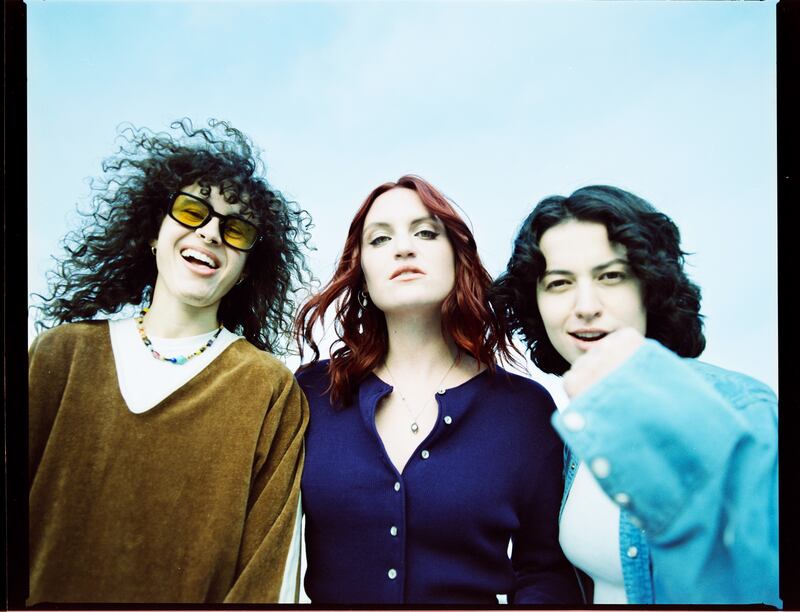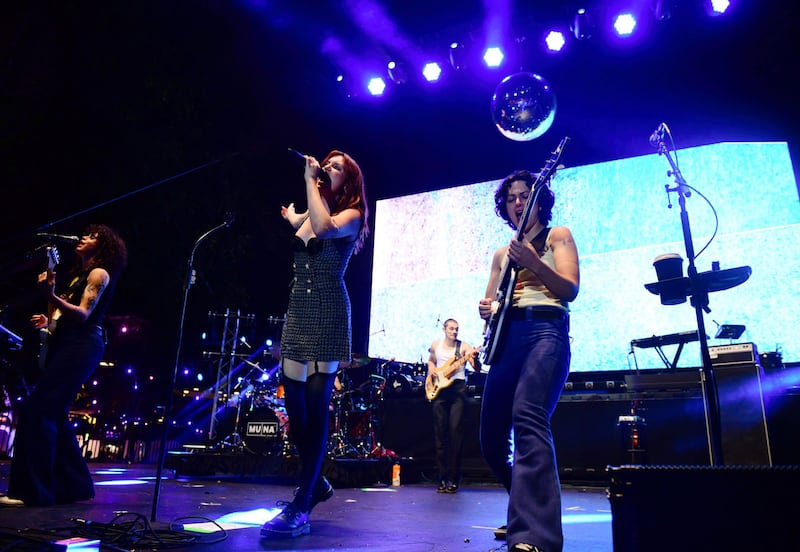MUNA is the queer indie pop band we need right now. Whether the trio is telling us “life’s so fun” with a “mini-skirt and rollerblades on” or reminding us that there is a place “where everyone’s gonna lay down their weapon,” the California-based band has been providing emotional support music for queers everywhere for more than five years now.
But this year has marked a turning point—not just for the band, but for me, too. In February, I watched as MUNA took the stage at Los Angeles’ Staples Center (sorry, I refuse to call it Crypto.com Arena and no amount of bitcoin will change that) to loud, widespread cheers.
Fans of Kacey Musgraves, who the band was opening for, were still trickling in, waiting for Kacey’s set to start later on. But those of us who were in the stadium, no matter who we came to see, were rapt as we watched MUNA perform. Lead singer and songwriter Katie Gavin commanded the stage, belting out her gorgeous, inclusive lyrics with passionate emotion.
After playing some new songs, all of which are from the band’s freshly released third, self-titled album, Katie informed the audience that the band was going to play an older song. It was one that was relevant to the safe space Kacey Musgraves created with her tour, Gavin explained, as means of set-up. With that, the band launched into “I Know A Place”—and the crowd’s response, mine included, was deafening.
“I Know a Place,” a 2017 single from the band’s debut About U, is a fantastic, fist-pumping track. It’s also especially poignant for me. I discovered MUNA shortly after coming out as non-binary in the summer of 2021, and this song became my anthem as I geared up to get top surgery. At the time of the concert, I was just a few weeks out from surgery, and the emotions I felt while hearing my favorite band perform this queer acceptance anthem live rushed over me. (Seriously, friends had to check that I was OK, based on how I was reacting.) Standing among thousands of others who were singing along, feeling all the feels, just as I was—it was overwhelming, in the best way.
The group ended its set with another personal favorite of mine and many other LGBTQ people out there: “Silk Chiffon,” the first single off of MUNA. Featuring indie rock woman of the moment Phoebe Bridgers, the song helped push MUNA further into the mainstream. Its cheerfully sapphic lyrics and accompanying music video, which recreated the lesbian cult classic But I’m A Cheerleader, made it a favorite on lesbian TikTok. But the out-and-proud lyrics aside, it’s also just an unmistakable bop. “Silk Chiffon” is MUNA at its best, combining sharp, accepting songwriting with stuck-in-your-head beats.
Whether I’m swaying my head to “Silk Chiffon” or shouting along to “I Know a Place,” MUNA always reminds me that there’s nothing quite like the power of music. It is there for us in our best moments and our worst. And the country’s in one of its worst moments, where gender identities and LGBTQ lives are constantly being threatened and subjected to hateful rhetoric. But despite living in a society that sometimes actively works to subdue them, the threesome in MUNA refuses to be anything but their authentic selves.

From left: Naomi McPherson; Katie Gavin; Josette Maskin.
Isaac SchneiderTwo days before the launch of the band’s newest album—which appropriately feels like its truest, most vulnerable record yet—The Daily Beast jumped on a Zoom call with Gavin, lead guitarist Josette Maskin, and guitarist/producer Naomi McPherson, who have been bandmates for years and friends for even longer. Their rapport is infectious and welcoming, despite the exhaustion they felt after a long promotional tour.
In our chat, the trio opened up about embracing the “queer band” moniker, whether the industry is becoming more accepting, and what it’s like creating music during such a tumultuous time.
This interview has been edited and condensed for clarity.
I read that when the band was just starting out, you all were hesitant at first about being called a “queer band.” Why was that and what has changed now?
Naomi McPherson: The root of the hesitance is something that still comes up a lot of the time. We've just gotten a lot better at seeing past it. It’s that your identity can supersede the art itself—that people will care more about that than they do about the actual quality of the art. I think the initial fear was [that] maybe we won't have as large of a potential audience, [or] maybe we won't have as many opportunities because of our queerness, if we're out from the beginning.
Katie just anticipated what was coming culturally in terms of the shift that we've experienced over the past 10 years and was just like, ‘it's not gonna be like that. It's gonna matter to people in a way that's good. Like how it would've mattered to us, like to have a band like us.’
Katie Gavin: It's interesting hearing Naomi say that maybe I had foresight about this shift, because I really don't remember. I just had a feeling in my body, like, ‘this is who we are.’ And I was proud of our identities already. And I was just like, ‘we're f---ing cool.’
Josette Maskin: We've all had such different experiences in our identities and coming out and being out. [Katie] pushed us, and I think we needed to be pushed, but I do think a lot of our hesitancy is also in how we have presented ourselves historically.
Gavin: And that could have been my femme privilege too, because it means something different in the marketplace of a femme, being like, ‘Oh, and here's the twist: I like girls.’
McPherson: There were musicians that we knew were queer that were not out at the time [we were starting]. And some of them were relatively femme and had large male fan bases. And I understand why you would feel kind of in a risky place when you're in that position.
Have you seen a change in the industry, in terms of queer representation in music?
Gavin: There's just so many more artists [now] that are out. Maybe there used to be this sense [that] there's going to be financial consequences for your career if you are out. Or just in terms of visibility, the pressure that was put on artists to market themselves as heterosexual so that they would have more of the market available.
In some ways, there's nothing radical about [being out]. Record labels are cool with people being out, because they understand that there's enough of a gay demographic [and] fan base to support the system financially. In some ways, these explanations are a little bit disheartening.
I went to your final show on the Kacey Musgraves tour in February 2022, and watching an all-queer band play openly queer music in a giant arena was a very surreal, powerful moment. What strides have you seen in the industry ,in terms of other artists helping lift up marginalized bands? And what would you like to see continue to happen?
McPherson: We've benefited greatly from the kindness of other bigger artists. What we're also aware of is the fact that we and some other artists might have more consumable aesthetics than other marginalized people. And it might be more difficult for those people to get the opportunities that we get. That's something that needs to change, and if we acquire any sort of ‘power’—big air quotes around ‘power,’ it's kind of a gross word—in this industry, I think it would feel so good to bring other people into the spotlight.
Maskin: This is no shade to our booking agents at all, but they were sending us a list of artists to see who could open for us [on tour in the fall], and it’s crazy how, [after we asked if they] could send us people of color, or people of marginalized gender identities, just how much smaller that list got.
I do think the industry needs to have its eyes opened more to how just because there has been some progress we need to actively make an effort to further the progress that has been made. And that's coming from people who are of marginalized gender identities.
McPherson: Ultimately, we just picked people that we had pitched from the beginning that we knew about. There was a flash in the pan moment where a lot of big corporations were very scared and they're like, ‘we're doing a lot of listening and learning’ and ‘to all you marginalized people, oh, it must be so hard to be you.’ And then just the way that it's fallen off on a larger scale just is such bullshit. So, we just gotta do our part and keep it going if we can.

The band performs at this year’s West Hollywood Pride event in California.
Chelsea Guglielmino/FilmMagicI love your song “I Know a Place,” from your first album. I actually got top surgery this year and that song was my anthem, as I was going through that experience. I listened to it on the way to surgery.
McPherson: Aw, mazel. I did that last year, so, shout-out.
Oh, yeah! Those six weeks of recovery are real fun.
I really love that song, because it’s about safe spaces for people like us. What is it like to put out music for the queer community during such a tumultuous time right now where we're facing a lot of hateful rhetoric and terrible laws?
McPherson: It feels kooky bananas to be living through what we're living through. It sucks so much. … I think music can, at the very least, provide a cathartic experience or a space in which to process feelings that you have about that. Or if you feel generally unsafe, but maybe you might feel [safer] in a community with certain people who are like you at a MUNA show or something like that, that's what we can do.
Gavin: We feel differently on different days. I think sometimes it can get the better of you, and … personally, it can lead to a sense of despair. And a lot of times we do have moments where we're wondering, ‘is this really the best way that I can be helping the world?’ But I think most of the time, we do feel pretty sure that being a part of this project like this is the best use of the gifts that we have.
I mean, we're very lucky. We're three people that have the ability to live independently in a city with a bunch of our gay friends and make gay music. There are some days where we're just like living our happy gay lives. I think it's important sometimes for people elsewhere to know that that's a possibility. A lot of fighting back is against homophobia.
Yeah. Living your truth can sometimes be the most effective way to fight back.
Gavin: There's a solace in knowing that you’re right. There’s a solace in just knowing [homophobes and transphobes] have it so fucked up, and the logic is so twisted. There’s so much fear… There’s gratitude in just being like, ‘Oh my God, I’m glad I don't have to deal with that. I’m glad I don’t have to inhabit that body.’







